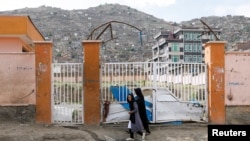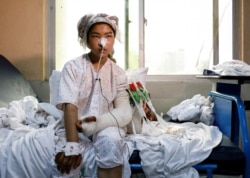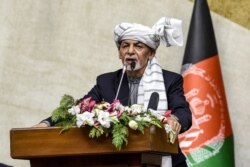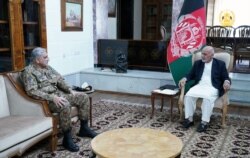The United States on Monday welcomed the Taliban’s declaration of a nationwide cease-fire in Afghanistan over this week’s Eid-al-Fitr festival, reiterating Washington’s call for the Islamist insurgency and Afghan leaders to negotiate an end to the “senseless violence.”
Addressing a routine news conference, State Department spokesman Ned Price also denounced Saturday’s bombing of a girls’ school in the Afghan capital, Kabul.
“The circumstances of the bombing over the weekend, they are not yet crystal clear. … There are some indications that this may have been attributable to ISIS and not the Taliban,” Price said using an acronym for Islamic State.
“We’re still looking into what or who is responsible, but I would note that ISIS has been responsible for similar attacks on Shia communities in Kabul in the past,” he said.
The attack happened in Kabul’s predominantly ethnic Hazara Shi'ite Muslim neighborhood of Dasht-e-Barchi, where Islamic State has repeatedly carried out attacks against schools, medical facilities and Shi'ite places of worship. At least 60 people, mostly schoolgirls, were killed.
Afghan officials reported that at least 150 people, including young students, were also injured. No one has claimed responsibility for the attack. The Afghan government accused the Taliban of being behind the violence, but the insurgents denied their involvement.
“We note the Taliban has denied involvement in the attack, and we welcome their announcement of a three-day cease-fire over the upcoming holiday,” Price said. “We urge the Taliban to extend the cease-fire and order a significant reduction in violence. We all know that a return to violence would be senseless, as well as tragic. We remind the Taliban that engaging in violence will not afford it legitimacy or durability.”
The Kabul bombing has fueled fears of more chaos and bloodshed after U.S. and NATO troops completely withdraw from Afghanistan by September 11 under instructions from President Joe Biden.
On Monday, Afghan President Ashraf Ghani ordered his national security forces to observe a cease-fire during the three-day Eid festival, which marks the end of Ramadan this week.
The move came a day after the Taliban announced that its leadership has directed insurgent fighters “to halt all offensive operations against the enemy” to enable Afghans to peacefully celebrate Eid.
“We call on the Taliban and Afghan leaders to engage seriously in the ongoing peace process to ensure the Afghan people enjoy a future free of terrorism and of senseless violence,” Price told reporters in Washington.
Afghanistan has experienced a spike in fighting in recent weeks, and observers see the temporary truce as a big relief for war-weary Afghans.
The Taliban have previously halted their hostilities during the Eid holiday but ignored calls for extending the truce and resumed fighting immediately after the three-day festivities.
The withdrawal of U.S.-led foreign troops is an outcome of a peace-building agreement Washington signed with the Taliban in February 2020 to close 20 years of the Afghan war, America’s longest.
However, the ensuing U.S. diplomatic efforts aimed at encouraging the Taliban and the Afghan government to negotiate a power-sharing deal that would permanently end the country’s long war have not succeeded.
The so-called intra-Afghan negotiations have been deadlocked for months. U.S. officials hope to accelerate the stalled peace process after the Eid festival.
But the Taliban have ruled out progress in the talks until Washington meets the group’s remaining demands in line with the U.S.-Taliban deal. Those demands include the release of around 7,000 Taliban prisoners from Afghan jails and the removal of United Nations and U.S. sanctions on top insurgent leaders.
Meanwhile, neighboring Pakistan’s army chief, General Qamar Javed Bajwa, on Monday visited Kabul to reaffirm his country’s support for the Afghan peace process in a meeting with Afghan President Ashraf Ghani. Britain’s chief of defense staff also attended the meeting.
Islamabad has long been accused of harboring Taliban leaders, but in recent years, Washington and other Western powers have hailed Pakistan’s efforts in bringing the insurgents to the negotiating table with U.S. interlocutors and rival Afghan groups.
Bajwa “reiterated that a peaceful Afghanistan means a peaceful region in general and a peaceful Pakistan in particular,” a post-meeting Pakistani military statement said. “We will always support (an) 'Afghan-led, Afghan-owned' peace process based on mutual consensus of all stakeholders,” he said.







